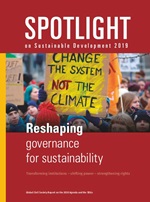Published on Tue, 2019-09-24 13:29
SDG Summit: 24-25 September 2019 SDG 9: Build resilient infrastructure, promote inclusive and sustainable industrialisation and foster innovation 24 September, New York: “Public infrastructure is the bedrock of our societies: it helps families thrive, and allows communities and businesses to grow”, says David Boys, from global trade union federation Public Services International. For this reason it is impossible to build a resilient infrastructure, an aspect of SDG 9, without a firm foundation of human rights and universal access to quality public services, says David Boys, writing in Spotlight 2019*, published by the Civil Society Reflection Group, which analyses annual progress on the 17 SDGs. |
Published on Mon, 2019-09-23 13:02
Global UN Watchdog warns that while big donors bridge the gap in WHO funding they are also shaping health programmes according to business norms, and marginalising public health programmes. The writers suggest measures to reinstate the WHO at the centre of Universal Health Coverage. When the Global Health Summit opens on Monday, its morning session will focus on using the campaign for Universal Health Coverage as a driver of the Sustainable Development Goal 3: Ensuring healthy lives. |
Published on Fri, 2019-09-20 10:34
Will world leaders at the Climate Summit match the courage of the school students who strike around the world against the climate emergency, or will they be put to shame? 20 September, New York: Will the tone of Monday’s UN Climate Summit pale in contrast with the courage of striking students who are taking a day off school in 120 countries, to march for action to confront the climate emergency, though many know they could face severe penalties? |
Published on Wed, 2019-09-18 21:03
With the focus firmly on preparations for the UN General Assembly (UNGA) High-Level Week (23-27 September), the Presidents of the General Assembly (PGAs) and the UN Secretary-General expressed their concerns and ambitions in closing the 73rd Session and opening the 74th Session. While the UNGA High-Level Week will feature high-level meetings on climate, universal health coverage, financing for development, the Sustainable Development Goals (SDGs), and solutions for Small Island Developing States (SIDS), the UNGA’s remit goes far beyond that week, with meetings spanning the entire year, and a new session beginning each September. |
Published on Mon, 2019-09-16 12:09
The 2030 Agenda for Sustainable Development clearly identifies several issues, ranging from finances, to climate to trade, where global governance agreement is required. But actual decisions on these issues often run in the opposite direction. Non-accountable ‘clubs’ exercise de facto authority and raise obstacles to implementing the SDGs. While leaders of all UN Member States decided on a transformative agenda for 2030, a de facto form of global governance, sometimes called ‘shadow governance’, works in the opposite direction. Operating in opposition to global norms as self-selected ’coalitions of the willing’ or in the interstices of national sovereignties-such as the global ‘shadow banking’ where illegal financial flows meet established financial arrangements- these major obstacles to achieving the SDGs are not loose trends or wild forces beyond control, but rather the result of a secretive but efficient network of governance ‘clubs’ that operate beyond public scrutiny or parliamentary oversight, the two accountability mechanisms identified in the 2030 Agenda. |
SUSCRIBE TO OUR NEWSLETTER






